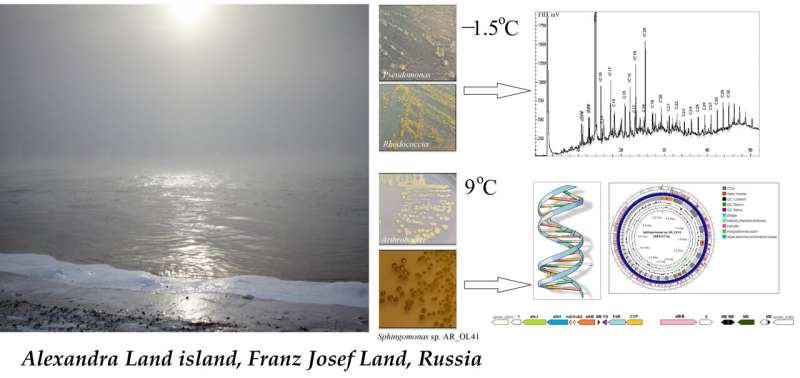This article has been reviewed according to Science X's editorial process and policies. Editors have highlighted the following attributes while ensuring the content's credibility:
fact-checked
proofread
Cold-resistant bacteria found in the Arctic can degrade crude oil

The Arctic region is being actively developed by humans, but it negatively affects the environment. The fact is that Arctic soils, which contain little organic matter, are susceptible to the toxic effects of hydrocarbons that get there as a result of the use of diesel fuel for energy and technology.
Pollution is complicated by permafrost conditions—hydrocarbons are "locked" in the soil. This makes it very difficult to physically remove them from the soil without damaging the permafrost.
Biologists have discovered that some bacteria have adapted to cold climates and high concentrations of petroleum products—they can grow in permafrost and transform hydrocarbons of petroleum origin. In the future, this will help the bioremediation of the Arctic, that is, the self-purification of soils with the help of bacteria.
"The Arctic chronically suffers from the consequences of human activity. In addition to climate change, the industrial development of the region has a negative impact. It has led to increased anthropogenic pollutants, which are very difficult to combat in northern conditions."
"The presence of permafrost leads to the formation of pollution zones in which most hydrocarbons are concentrated, and logistical restrictions and climatic features of the northern regions complicate the possibility of reclamation. Mechanical cleaning of contaminated permafrost soil by excavating it is undesirable because this will lead to disruption of the permafrost at the site of the removed layer and the formation of craters and sinkholes."
"One of the solutions to this problem could be biological treatment, which is carried out directly at the site of contamination, bioremediation," Vladimir Myazin, Ph.D., a researcher at RUDN University said.
Four strains of bacteria from the genera Pseudomonas, Rhodococcus, Arthrobacter, and Sphingomonas were studied at the Winogradsky Institute of Microbiology. They were isolated from oil-contaminated soil on the island of Alexandra Land in the Franz Josef Land archipelago in the Arctic Ocean. In the laboratory, bacteria were grown in oil at temperatures ranging from -1.5°C to 35°C, and studies were carried out on their metabolic potential and physiological characteristics.
The isolated strains turned out to be psychrotolerant, that is, capable of growing quickly not only in summer but also in cold conditions when other microorganisms are inactive. They decomposed natural biopolymers (xylan, chitin) and acyclic hydrocarbons of linear or branched structure (alkanes) and also converted phosphates into soluble forms.
Growth at negative temperatures led to a change in the spectrum of hydrocarbons used and a decrease in the size of bacteria. Microbiologists also analyzed the genome of the bacterium Sphingomonas sp. AR_OL41. In the deciphered genome, genes were discovered that encode enzymes responsible for the degradation of alkanes, as well as other genes that determine the adaptation of the strain to hydrocarbon pollution and low temperatures.
"These bacteria can contribute to the self-purification of Arctic soils from hydrocarbons. They have the potential for bioremediation of northern territories."
"Joint research of biologists from RUDN University with colleagues from the Winogradsky Institute of Microbiology is continuing, joint projects are planned aimed at studying the structure and functional profile of microbial communities of soils in the Arctic zone contaminated with oil products and heavy metals," Vladimir Myazin, Ph.D., a researcher at RUDN University said.
The work is published in the journal Microorganisms.
More information: Ekaterina M. Semenova et al, Crude Oil Degradation in Temperatures Below the Freezing Point by Bacteria from Hydrocarbon-Contaminated Arctic Soils and the Genome Analysis of Sphingomonas sp. AR_OL41, Microorganisms (2023). DOI: 10.3390/microorganisms12010079
Provided by Scientific Project Lomonosov



















